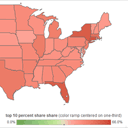
Generation Debt
Education is a human right. Anyone willing and able should be able to attend an institution of higher education irrespective of their ability to pay for it.


Education is a human right. Anyone willing and able should be able to attend an institution of higher education irrespective of their ability to pay for it.

Without an overhaul of how we understand student benefits, making college free would boost the wealth of college attendees without any egalitarian gains.

Only a mass movement by union members and sympathetic workers will transform organized labor into the bold agent of change it once was.

Political scientists Dorothy Solinger and Mark Frazier talk to Jeffrey Wasserstrom about China’s often overlooked urban poor, and how their conditions are—and aren’t—changing.

The Federal Reserve model undermines economic well-being by concentrating power—and therefore wealth and income—in fewer and fewer hands.

As historian Steve Fraser sees it, we should look toward the “long nineteenth century” for inspiration in constructing a new, lasting American resistance to capitalism.

How can widespread inequality progress alongside widespread concern about its ill effects?

When even the big banks start to worry about inequality, you know something is seriously wrong.

Tim Shenk spoke with political scientist Wendy Brown about her new book, Undoing the Demos: Neoliberalism’s Stealth Revolution, and the political consequences of viewing the world as an enormous marketplace.

Will tech billionaires overwhelm the city’s resurgent progressive tradition?

The “suspension bridge” of top income shares (based on the work of Thomas Piketty and colleagues) is by now a familiar icon of American inequality. In this rendering, top-end inequality (measured as the share of national income going to the …

The problems of Brooklyn’s gentrifying neighborhoods won’t be solved by a housing-market version of “ethical consumption.” It’s going to take collective action. And a new tenant movement is leading the way.
Percentage of black residents in Ferguson, Missouri: 67 Of black police officers: 5.7 Percentage of traffic stops targeting black residents in Ferguson: 86 Of arrests: 93 Distance in miles from Ferguson to St. Louis suburb of Ladue: 10 Rank of …

Why don’t popular economic ideas become policy?

How America’s suburbs are engineered against the walking poor